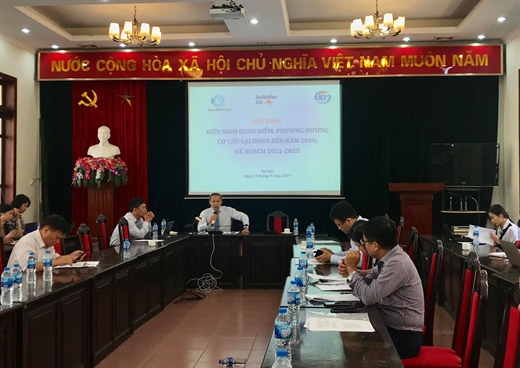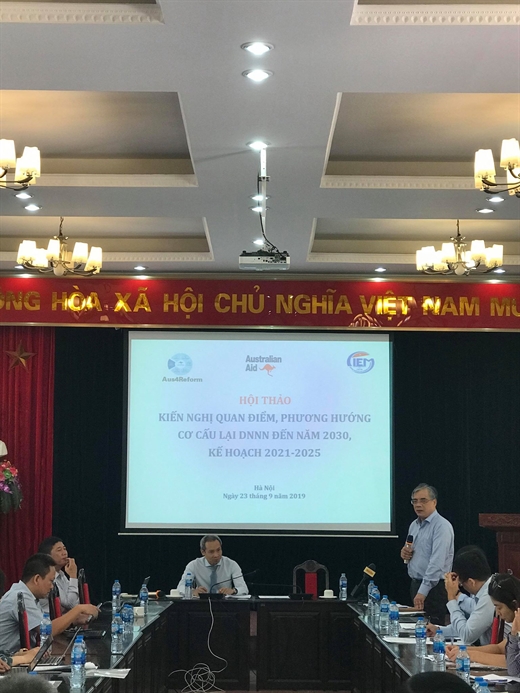Australia supports Economic Reform in Vietnam (Aus4Reform)
- en
- News and Media
- Aus4Reform News
- Proposing perspectives and directions for restructuring State-owned enterprises by 2030
24/9/2019
Proposing perspectives and directions for restructuring State-owned enterprises by 2030
In order to propose solutions to accelerate the restructuring of state-owned enterprises (SOEs) to build a socio-economic development strategy in 2021-2030, on September 23rd morning, in Hanoi, within the framework of the Program "Australia support Vietnam's economic reforms" (Aus4Refrom), the Central Institute for Economic Management (CIEM) organized a seminar to announce the research results "State economy and restructure state-owned enterprises: evaluate the results of the 2011-2020 period and propose solutions for the 2021-2030 period”.
Proposing perspectives and directions for restructuring State-owned enterprises by 2030
In order to propose solutions to accelerate the restructuring of state-owned enterprises (SOEs) to build a socio-economic development strategy in 2021-2030, on September 23rd morning, in Hanoi, within the framework of the Program "Australia support Vietnam's economic reforms" (Aus4Refrom), the Central Institute for Economic Management (CIEM) organized a seminar to announce the research results "State economy and restructure state-owned enterprises: evaluate the results of the 2011-2020 period and propose solutions for the 2021-2030 period”.
At the seminar, experts had many ideas summarizing the stage of SOE restructuring in the past 10 years.
 |
| The workshop overview |
“In 2010, the process of organizing, renewing, developing and improving the efficiency of SOE had achieved many positive results.” said Mr. Pham Duc Trung, Head of the Enterprise Development and Reform Research Department (CIEM).
It is expected that from 2011 to 2020, the ownership of 750 SOE will be converted by equitization. Particularly, from 2016 to June 2019, the authorities had been transferring 185 trillion VND from the Business Development and Restructuring Assistance Fund to the state budget, reaching 74% of the plan.
However, the Report also presented many shortcomings of SOEs, such as the efficiency of state capital investment was lower than other economic sectors, the targets on budget revenue, job creation... decreasing; The leading, regulating or directing role of SOEs has not been clearly shown, the pervasive power is not high; The capital turnover ratio of enterprises is low...
Associate Professor Ph.D Tran Dinh Thien, former Director of CIEM, said that the equitization process in Vietnam was quick but the ownership conversion was reached only 5-7%. Over 10 years of restructuring, SOEs still cannot change the hinge.
 |
| Associate Professor Ph.D Tran Dinh Thien, former Director of CIEM said at the workshop |
“A post-equitization enterprise has reached better results deserves praise but that doesn’t mean we can properly evaluate the effectiveness of equitization because we didn’t evaluate them according to all of the criteria” - He emphasized.
Proposing solutions to improve the efficiency and restructure SOEs by 2030, Ph.D Nguyen Dinh Cung, economist and Program Director of AUS4REFORM, said that the task of restructuring SOEs according to the 2016-2020 socio-economic development plan should be continued in the direction of: SOEs focus on key and essential fields; important areas and national defense and security.
Agreeing with this view, Mr. Pham Duc Trung also said In the next period, it is not necessary to identify SOEs as “major physical force of the state economy”, and use SOEs as a tool of economic regulation, macroeconomic stability and market stabilization.
Promoting equitization and selling capital in enterprises that the State does not need to own or hold dominant shares, including those doing business effectively.
Besides, it is necessary to separate production and business tasks and political tasks, perfecting institutions so that the equitization of enterprises can bring substantive effects.
In the conclusion of the conference, Mr. Phan Duc Hieu, Deputy Director, Central Institute for Economic Management said that, in the future, the research team will continue to review, amend and supplement to have the complete report that can provide the most accurate analysis of the restructuring of SOEs and help us to come up with more effective and practical restructure SOEs solutions.

